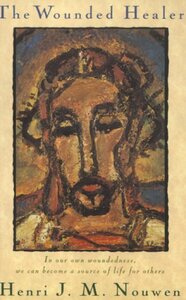Take a photo of a barcode or cover
This short book was a lovely pairing to Brené Brown’s Dare to Lead. Our woundedness does not disqualify us from ministering to others, but rather, it is the very posture from which we can be empowered in empathy and wisdom to meet others right where they’re at. Even more, a place from where we can lead. (And Henri Nouwen posits that we are all in such positions, maintaining that even one-on-one relationships are opportunities for leading.) Though Nouwen’s first chapter on the Nuclear Man doesn’t mirror today’s generations, the rest of this book has proven to stand the test of time and is ever-relevant. I was especially struck by Nouwen’s thoughts on loneliness. Together or alone, our suffering is painful, but can also be fruitful.
short and concise, but so potent and really timeless. i hope to read more of his work in the future
Beautiful and profound. This book is short and simply written, but its theological themes are deep. Nouwen articulates a theology of ministry, service, and Christian leadership that addresses the needs of the modern (postmodern?) world and considers the wounded heart of the Christian leader as absolutely necessary in this pursuit.
I love to see a contemporary version of this book, though of course, I realize that Nouwen isn't around to do this work. I'd like to see a dissection of the 2020s culture and millennial/Gen Z population, and then extrapolate a theology of Christian leadership from these elements. I imagine some things would be similar (e.g. feeling disconnected and 'fatherless'); however, I'd like to see these themes explored in the context of the COVID-19 pandemic, current crises facing the Euro-American church, and the impact of the majority world and global church on Euro-America.
The topic of how to serve our people well is an ongoing conversation and I'm grateful for what Nouwen has contributed.
I love to see a contemporary version of this book, though of course, I realize that Nouwen isn't around to do this work. I'd like to see a dissection of the 2020s culture and millennial/Gen Z population, and then extrapolate a theology of Christian leadership from these elements. I imagine some things would be similar (e.g. feeling disconnected and 'fatherless'); however, I'd like to see these themes explored in the context of the COVID-19 pandemic, current crises facing the Euro-American church, and the impact of the majority world and global church on Euro-America.
The topic of how to serve our people well is an ongoing conversation and I'm grateful for what Nouwen has contributed.
A wonderful contemplative look at how our own woundedness can lead others to healing.
Henri’s writing penetrates deep within my soul once again. He is a person I feel a connection towards that I do not feel with many others. I so wish that he would still be with us.
At first I felt this book was a bit dated, but as I read on there were plenty of ideas that were relevant to me. Nouwen's discussion of what it means to be a Christian leader and what ministers or leaders aim to do in society are in stark contrast with what often ends up happening in churches I've been in. I noted that Nouwen references Rogers and Jung, and his own person-centered style of approach is evident throughout this book. I would recommend this book for ministers or counsellors wanting to incorporate spirituality into their practice.
informative
inspiring
reflective
slow-paced
A call to martyrdom, a continuous death to self so that others are put above. A beautiful insight into compassion and the embodiment of love and service.
This is my third time through this classic in religion. The first time I read it, I was not-long out of college, working in a crisis center and taking clinical pastoral education. This was the right book for me at the time: Nouwen includes an excellent verbatim of some ineffective pastoral counseling in a hospital setting. The second time I read this book, I was considering entering into the E. priesthood. Again, the book was intensely relevant to my life at the time. Nouwen spoke to the importance of allowing our awareness of our own woundedness to inform our ministry without using our woundedness as a direct shield or a tool. Now, 15 years later, I decided to read the book -again- because I am in such a different place in my life, professionally and especially spiritually, that I wanted to see if this "old faithful" still held any relevance for me. While I found Nouwen a bit dated in his description of "nuclear man" (which almost struck me as quaint) and in his nearly exclusive use of the male gender pronoun throughout his writing (for these reasons I have down-graded my rating from 5 stars to 4), his thoughts on woundedness are as powerful as ever. Skip the first chapter perhaps, but the rest of the book is still pretty golden.







